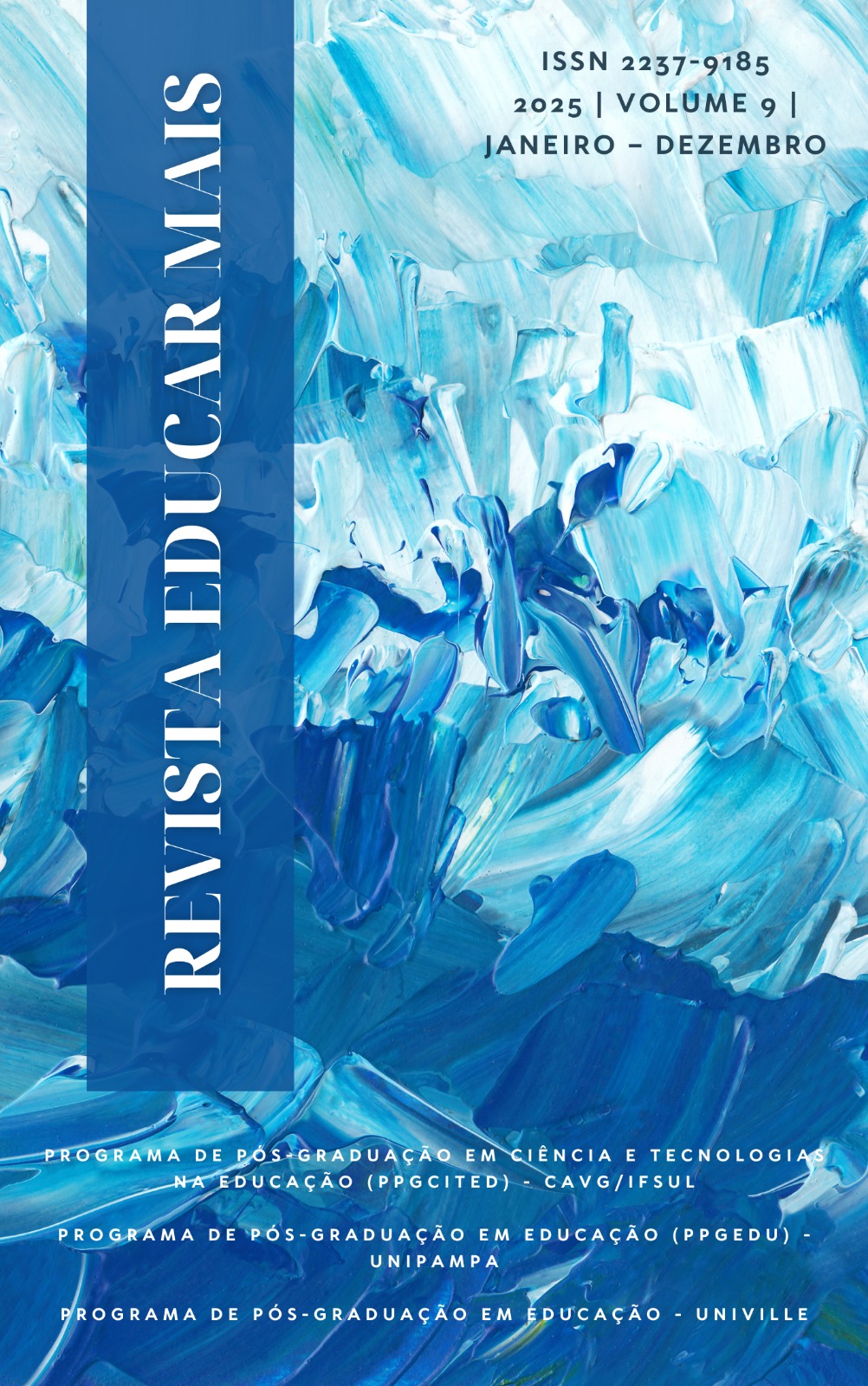The relationship between love and education from coexistential pedagogy and its projimophilic and vida-philic principles
DOI:
https://doi.org/10.15536/reducarmais.9.2025.4238Keywords:
Love, Education, Coexistentiality, Gnoseoepistemology, VitaphiliaAbstract
The causal, circular, or rhizomatic relationship between love and education has been addressed in different periods of history by various thinkers and disciplines. Fundamentally from the duality of two perspectives: (a) that of ontological or essential, pure, spiritual love, which in education is often confused with domestication, religious indoctrination, in a pattern focused more on preaching than practicing; and (b) that of epistemological or existential love, a socio-historical-cultural construction on how love is interpreted and lived in the world, a context in which it is often objectified, colonized, commodified, romanticized, or psychopathologized. This review article analyzes the love-education relationship from a perspective that dialogically and recursively integrates the essential and existential approach to love and education. This research is undertaken from the teleological, methodological and anthropological foundations of the pedagogy of coexistence, an educational proposal built from the hologrammatic inclusion of the epistemology of being-existing-coexisting.
Downloads
References
ALARCÓN, Patricio: BAZÁN, Domingo. Inclusión y ontoempatía: ¿qué tan difícil es ponerse en el lugar del otro? Homo Sapiens En Escuela Inclusiva, p.153-168, 2019.
ALARCÓN, Patricio. Coexistencia y educación. Santiago: Editorial Cuarto Propio, 2015
ALARCÓN, Patricio. Coexistencialismo. Travesías hacia una mismidad-otredad: Auténtica, inclusiva y liberada. Santiago: Editorial Cuarto Propio, 2024.
ALARCÓN, Patricio. Distinciones y reflexiones sobre una integración educativa Coexistencial. Revista Paulo Freire, Santiago. v.7, n. 5, p.125-143, 2006.
ALARCÓN, Patricio. Hacia una pedagogía de la coexistencia. Revista de Pedagogía Crítica Paulo Freire, México, n.3, p.63-85, 2005.
ALARCÓN, Patricio. Intimidad Educativa Coexistencial: El valor de la mismidad y la otredad en el contexto de la formación universitaria. España: Editorial Académica Española, 2017.
ALARCÓN, Patricio. La vidafilia como énfasis primordial de la pedagogía de la coexistencia.
BATESON, Gregory. Pasos hacia una ecología de la mente. Santiago: Editorial Planeta, 1997.
BIBLIA LATINOAMERICANA. Santiago de Chile: Bandera de Chile, 2019.
FRANKL, Víctor. Ante el vacío Existencial. Hacia la humanización de la Psicoterapia. Santiago: Editorial Herder, 1990.
FROMM, Erich. Psicoanálisis de la sociedad contemporánea. Santiago: Editorial Fondo de Cultura Académica, 2012.
HAN, Byung-Chul. Capitalismo y pulsión de muerte. Madrid: Herder, 2016.
HARAWAY, Donna. Seguir con el problema. Generar parentesco en el Chthuluceno. Bilbao: Consonni, 2019.
HAWKINS, David. Biología de la entrega. España: Ediciones Obelisco, 2013.
LANGLE, Alfried. Vivir con sentido. Buenos Aires: Edit. Lumen, 2008.
LEVINAS, Emmanuel. De la existencia al existente. Madrid: Editorial Arena, 2000a.
LEVINAS, Emmanuel. La huella del otro. Madrid: Taurus, 2000b.
LEVINAS, Emmanuel. Entre nosotros: Ensayos para pensar al otro. Valencia: Editorial Pretextos, 1993.
LIPTON, Bruce. La biología de la creencia. Barcelona: Barcelona: Edit. Lumen, 2016.
MATURANA, Humberto. Transformación en la convivencia. Santiago: Dolmen Ediciones, 1999.
MATURANA, Humberto. Amor y juego: fundamentos olvidados de lo humano. Santiago: Editorial Instituto de Terapia Cognitiva, 1994a.
MATURANA, Humberto. Emociones y lenguaje en educación y política. Santiago: Hachette, 1994a.
MATURANA, Humberto. Objetividad: Un Argumento para Obligar. Santiago: Dolmen, 1997.
MORIN, Edgar. Mi camino. Barcelona: Gedisa editorial, 2005.
NARANJO, Claudio. Cambiar la educación para cambiar el mundo. España: Editorial La Llave, 2007.
ORTEGA, Pedro; GIL, Ramón. Educación para la convivencia: la tolerancia en la escuela. Barcelona NAU Libres, 1994.
VARELA, Francisco. El fenómeno de la vida. Argentina: Editorial Gránica, 2010.
WILLI, Jürg. La pareja humana relación y conflicto. Madrid: Editorial Morata, 1993.
Downloads
Published
How to Cite
Issue
Section
License
Copyright (c) 2025 Patricio Alarcón Carvacho

This work is licensed under a Creative Commons Attribution-NonCommercial 4.0 International License.
DECLARATION OF RESPONSIBILITY: I hereby certify that I partially or fully participated in the conception of the work, that I did not hide any links or financial agreements between the authors and companies that may be interested in this article publication. I certify that the text is original and that the work, partially or fully, or any other work with a substantially similar content written by me, was not sent to any other journal and it will not be send while my submission is being considered by Revista Educar Mais, whether in printed or electronic format.
The author responsible for the submission represents all the authors of the manuscript and, when sending the article to the journal, guarantees s/he has obtained the permission to do so, as well as s/he guarantees the article does not infringe upon anyone’s copyright nor violate any proprietary rights. The journal is not responsible for the opinions expressed.
Revista Educar Mais is Open Access, does not charge any fees, whether for submission or article processing. The journal adopts Budapest Open Access Initiative (BOAI)’s definition, i.e., any users are permitted to read, download, copy, distribute, print, search and link to the full texts of these articles.
All the articles are published under the Creative Commons Atribuição-NãoComercial 4.0 Internacional license. The authors keep the copyright of their production. That way, they must be contacted directly if there is any interest in commercial use of their work.
















